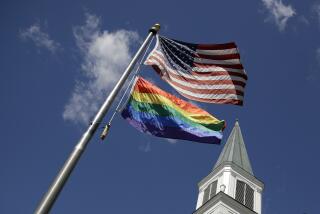30th Anniversary Marked : United Church of Christ Turns Its Eyes to Future
- Share via
The United Church of Christ, an American denomination that began a new kind of adventure in church history, is still venturing and probing its special frontiers.
“A future-driven church,” its president, the Rev. Avery Post, calls it, “an adventurous people of God.”
That company of Christians, 1.7 million of them, this week marks the 30th anniversary of formation, the first and only U.S. church merger to blend denominations of different national origins and of governing systems.
As was the case 30 years ago, “we invoke the word adventure” anew, Post says, still “reaching for and hoping for a journey of change and surprise.”
Meeting in Cleveland
That ferment is particularly evident on the social and theological fronts as the denomination’s biennial, representative synod opened its six-day meeting Thursday in Cleveland.
There, the 700-plus voting delegates and thousands of other members are expected to take part Sunday in the denomination’s biggest processional and worship service, re-enacting the church’s founding events.
That took place in Cleveland on June 25, 1957, combining the British-derived Congregational Christian Churches and the German-derived Evangelical and Reformed Church.
Other church mergers have rejoined divided church families, such as the 1983 merger of Southern and Northern Presbyterians into the Presbyterian Church (USA) and the 1987 fusion of three Lutheran branches into the Evangelical Lutheran Church in America.
But the United Church cuts across not only different national origins, but also different creedal heritages and functioning policies.
Congregationalism stemmed from the Puritan “Pilgrim Fathers” in America. In the united body, the autonomy of each of the 6,408 congregations is preserved, but national and regional units provide connecting, operational ties.
‘Serve His Kingdom’
The aim of the merging Christians, as defined in their constitution, was to “express more fully the oneness in Christ,” to “make more effective their common witness” to Him and “to serve His kingdom in the world.”
Has it worked? Post, the church’s president for 10 years, compares the outcome to a painting described as “every inch alive and worth framing.”
While not claiming the unified church is a “masterpiece,” he said: “Every inch of the canvas of our ministry and mission is alive and worth framing.”
It is especially active in the doctrinal arena, where a quest for “theological self-understanding” has spurred a recent flood of doctrinal forums, both right and left, conservative and innovative.
A “spiritual renewal” drive has been on for two years in a denomination sometimes criticized as overly concentrating on issues of social justice.
Post terms these theological discussions a “difficult and urgent time. It is clear that God is in the midst of us, shaking us out of our theological lethargy, judging us for pining after cheap grace.”
A conference on the church’s mission in January presented its declaration for action by asserting the church’s commitment to “follow the way of the crucified and risen Christ” by such pursuits as these:
- “To praise God, confess our sin and joyfully accept God’s forgiveness; to proclaim the Gospel of Jesus Christ in our suffering world; to embody God’s love in all people; to hear and give voice to creation’s cry for justice and peace.”
- “To join oppressed and troubled people in the struggle for liberation; to work for justice, healing and wholeness of life; . . . to discern and celebrate the present and coming reign of God.”
Other proposed documents on theological matters call members to a “life of simplicity,” rejecting modern material obsessions, and urge a combining of evangelism with work for justice and peace.
In the social sphere, proposed measures would start a major program to combat acquired immune deficiency syndrome, supporting the U.S. surgeon general’s appeal for early sex education and advertising of condoms as “preventive education.”
Divestment Issue
Another proposal would stiffen criteria for divestment in corporations doing business, directly or indirectly, in South Africa, to oppose Pretoria’s apartheid system.
Another proposal would strengthen the denomination’s leadership in advocacy for women. The church, through its congregational antecedents, was the first to ordain a woman in 1853, and 1,460 of its 10,085 present ministers are women.
That’s about 14%, the highest ratio of ordained women in any denomination.
More to Read
Sign up for Essential California
The most important California stories and recommendations in your inbox every morning.
You may occasionally receive promotional content from the Los Angeles Times.













